Business Law Report: Business Law, UK Regulations, and Legal Solutions
VerifiedAdded on 2020/12/09
|15
|5094
|321
Report
AI Summary
This report provides a comprehensive overview of UK business law, delving into the core principles and sources of law, including statutory, common, and EU law. It examines the concept of parliamentary sovereignty and its implications, alongside the roles of government in the law-making process. The report further explores workplace regulations, such as health and safety and equal opportunities, detailing the duties and responsibilities of company directors. It also discusses legal solutions for various business scenarios, including creditor rights and liquidation processes, providing insights into how businesses can navigate legal challenges and resolve disputes effectively. The report's structure includes an introduction, detailed sections on key topics, and a conclusion summarizing the findings, along with a list of references for further study.
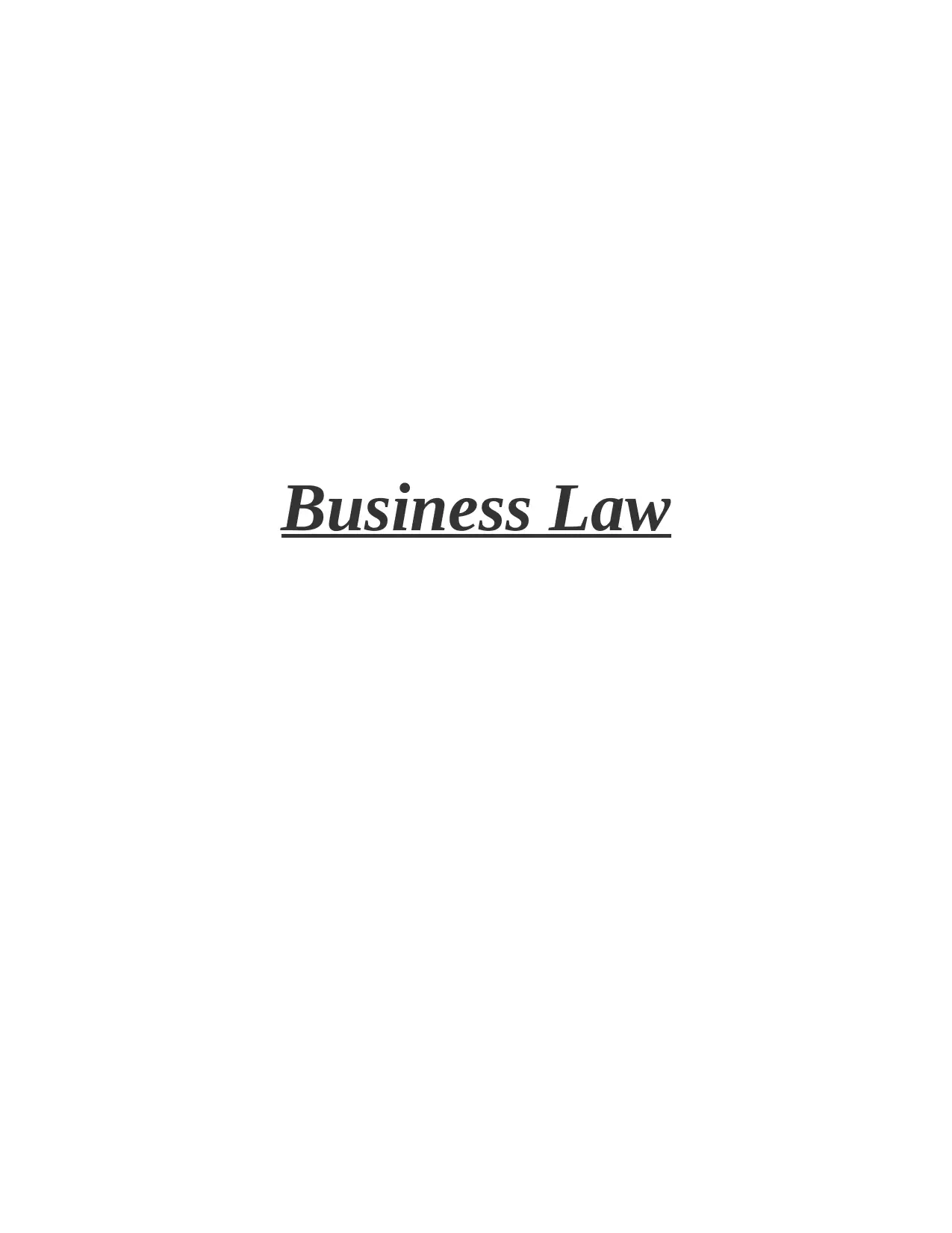
Business Law
Paraphrase This Document
Need a fresh take? Get an instant paraphrase of this document with our AI Paraphraser
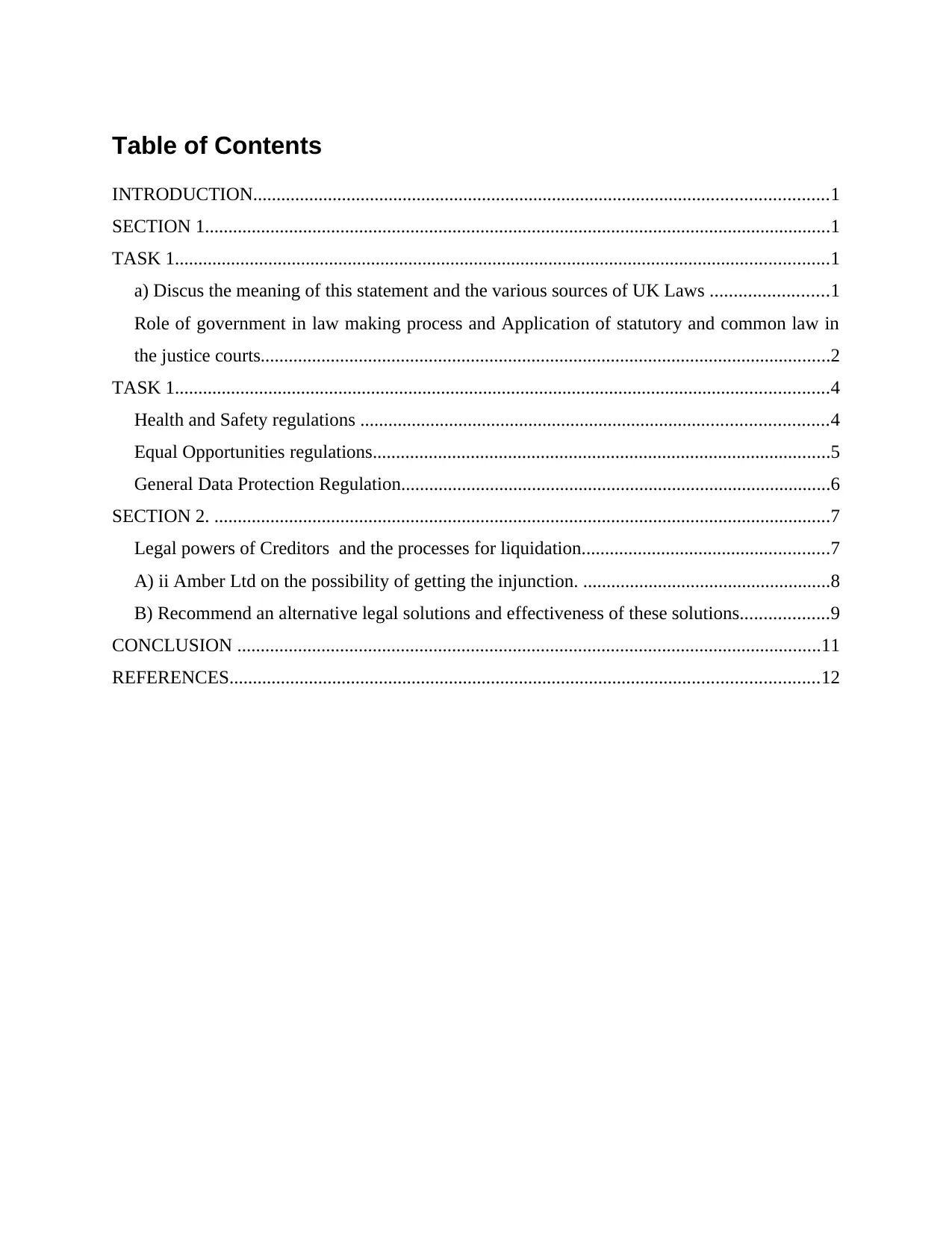
Table of Contents
INTRODUCTION...........................................................................................................................1
SECTION 1......................................................................................................................................1
TASK 1............................................................................................................................................1
a) Discus the meaning of this statement and the various sources of UK Laws .........................1
Role of government in law making process and Application of statutory and common law in
the justice courts..........................................................................................................................2
TASK 1............................................................................................................................................4
Health and Safety regulations ....................................................................................................4
Equal Opportunities regulations..................................................................................................5
General Data Protection Regulation............................................................................................6
SECTION 2. ....................................................................................................................................7
Legal powers of Creditors and the processes for liquidation.....................................................7
A) ii Amber Ltd on the possibility of getting the injunction. .....................................................8
B) Recommend an alternative legal solutions and effectiveness of these solutions...................9
CONCLUSION .............................................................................................................................11
REFERENCES..............................................................................................................................12
INTRODUCTION...........................................................................................................................1
SECTION 1......................................................................................................................................1
TASK 1............................................................................................................................................1
a) Discus the meaning of this statement and the various sources of UK Laws .........................1
Role of government in law making process and Application of statutory and common law in
the justice courts..........................................................................................................................2
TASK 1............................................................................................................................................4
Health and Safety regulations ....................................................................................................4
Equal Opportunities regulations..................................................................................................5
General Data Protection Regulation............................................................................................6
SECTION 2. ....................................................................................................................................7
Legal powers of Creditors and the processes for liquidation.....................................................7
A) ii Amber Ltd on the possibility of getting the injunction. .....................................................8
B) Recommend an alternative legal solutions and effectiveness of these solutions...................9
CONCLUSION .............................................................................................................................11
REFERENCES..............................................................................................................................12
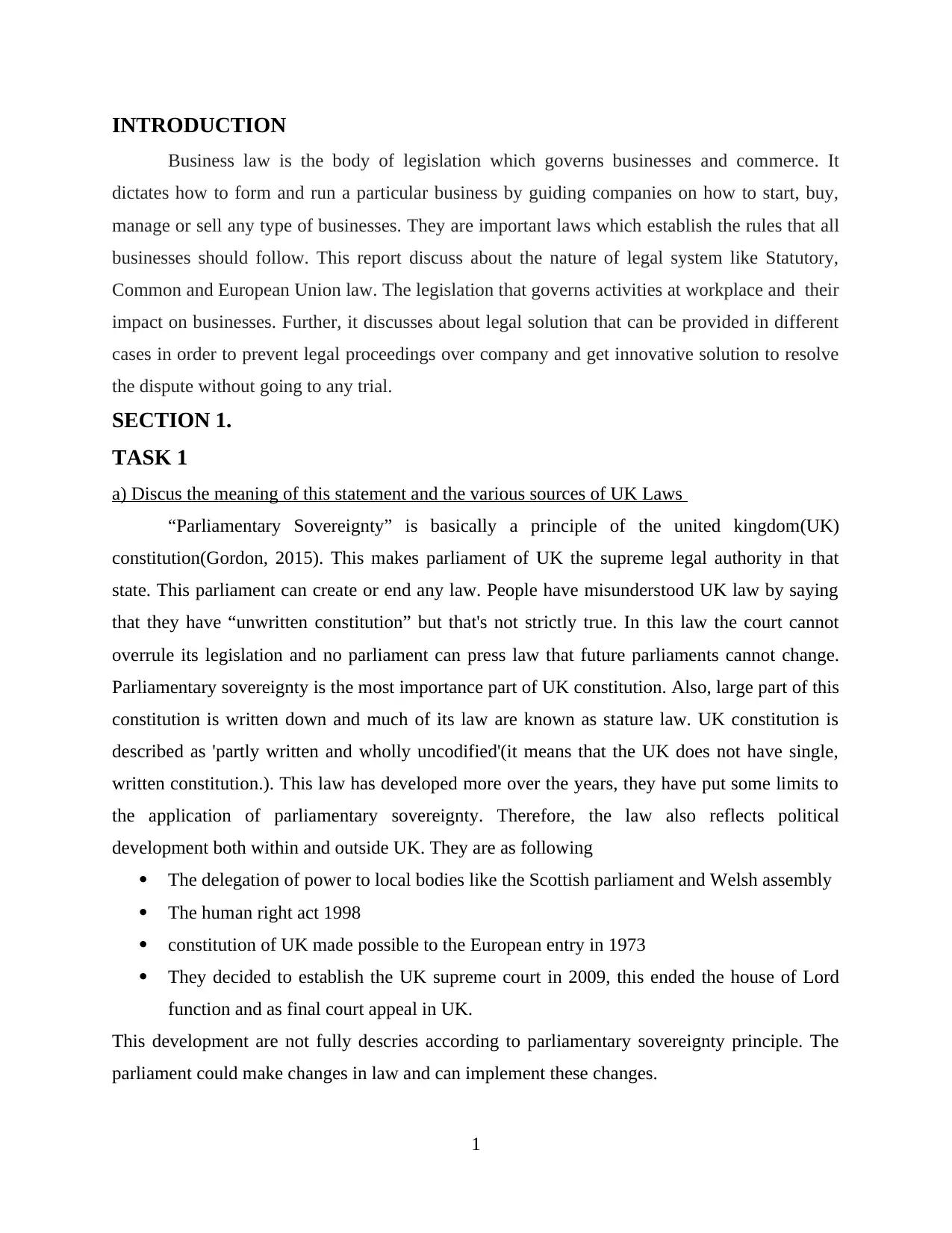
INTRODUCTION
Business law is the body of legislation which governs businesses and commerce. It
dictates how to form and run a particular business by guiding companies on how to start, buy,
manage or sell any type of businesses. They are important laws which establish the rules that all
businesses should follow. This report discuss about the nature of legal system like Statutory,
Common and European Union law. The legislation that governs activities at workplace and their
impact on businesses. Further, it discusses about legal solution that can be provided in different
cases in order to prevent legal proceedings over company and get innovative solution to resolve
the dispute without going to any trial.
SECTION 1.
TASK 1
a) Discus the meaning of this statement and the various sources of UK Laws
“Parliamentary Sovereignty” is basically a principle of the united kingdom(UK)
constitution(Gordon, 2015). This makes parliament of UK the supreme legal authority in that
state. This parliament can create or end any law. People have misunderstood UK law by saying
that they have “unwritten constitution” but that's not strictly true. In this law the court cannot
overrule its legislation and no parliament can press law that future parliaments cannot change.
Parliamentary sovereignty is the most importance part of UK constitution. Also, large part of this
constitution is written down and much of its law are known as stature law. UK constitution is
described as 'partly written and wholly uncodified'(it means that the UK does not have single,
written constitution.). This law has developed more over the years, they have put some limits to
the application of parliamentary sovereignty. Therefore, the law also reflects political
development both within and outside UK. They are as following
The delegation of power to local bodies like the Scottish parliament and Welsh assembly
The human right act 1998
constitution of UK made possible to the European entry in 1973
They decided to establish the UK supreme court in 2009, this ended the house of Lord
function and as final court appeal in UK.
This development are not fully descries according to parliamentary sovereignty principle. The
parliament could make changes in law and can implement these changes.
1
Business law is the body of legislation which governs businesses and commerce. It
dictates how to form and run a particular business by guiding companies on how to start, buy,
manage or sell any type of businesses. They are important laws which establish the rules that all
businesses should follow. This report discuss about the nature of legal system like Statutory,
Common and European Union law. The legislation that governs activities at workplace and their
impact on businesses. Further, it discusses about legal solution that can be provided in different
cases in order to prevent legal proceedings over company and get innovative solution to resolve
the dispute without going to any trial.
SECTION 1.
TASK 1
a) Discus the meaning of this statement and the various sources of UK Laws
“Parliamentary Sovereignty” is basically a principle of the united kingdom(UK)
constitution(Gordon, 2015). This makes parliament of UK the supreme legal authority in that
state. This parliament can create or end any law. People have misunderstood UK law by saying
that they have “unwritten constitution” but that's not strictly true. In this law the court cannot
overrule its legislation and no parliament can press law that future parliaments cannot change.
Parliamentary sovereignty is the most importance part of UK constitution. Also, large part of this
constitution is written down and much of its law are known as stature law. UK constitution is
described as 'partly written and wholly uncodified'(it means that the UK does not have single,
written constitution.). This law has developed more over the years, they have put some limits to
the application of parliamentary sovereignty. Therefore, the law also reflects political
development both within and outside UK. They are as following
The delegation of power to local bodies like the Scottish parliament and Welsh assembly
The human right act 1998
constitution of UK made possible to the European entry in 1973
They decided to establish the UK supreme court in 2009, this ended the house of Lord
function and as final court appeal in UK.
This development are not fully descries according to parliamentary sovereignty principle. The
parliament could make changes in law and can implement these changes.
1
⊘ This is a preview!⊘
Do you want full access?
Subscribe today to unlock all pages.

Trusted by 1+ million students worldwide
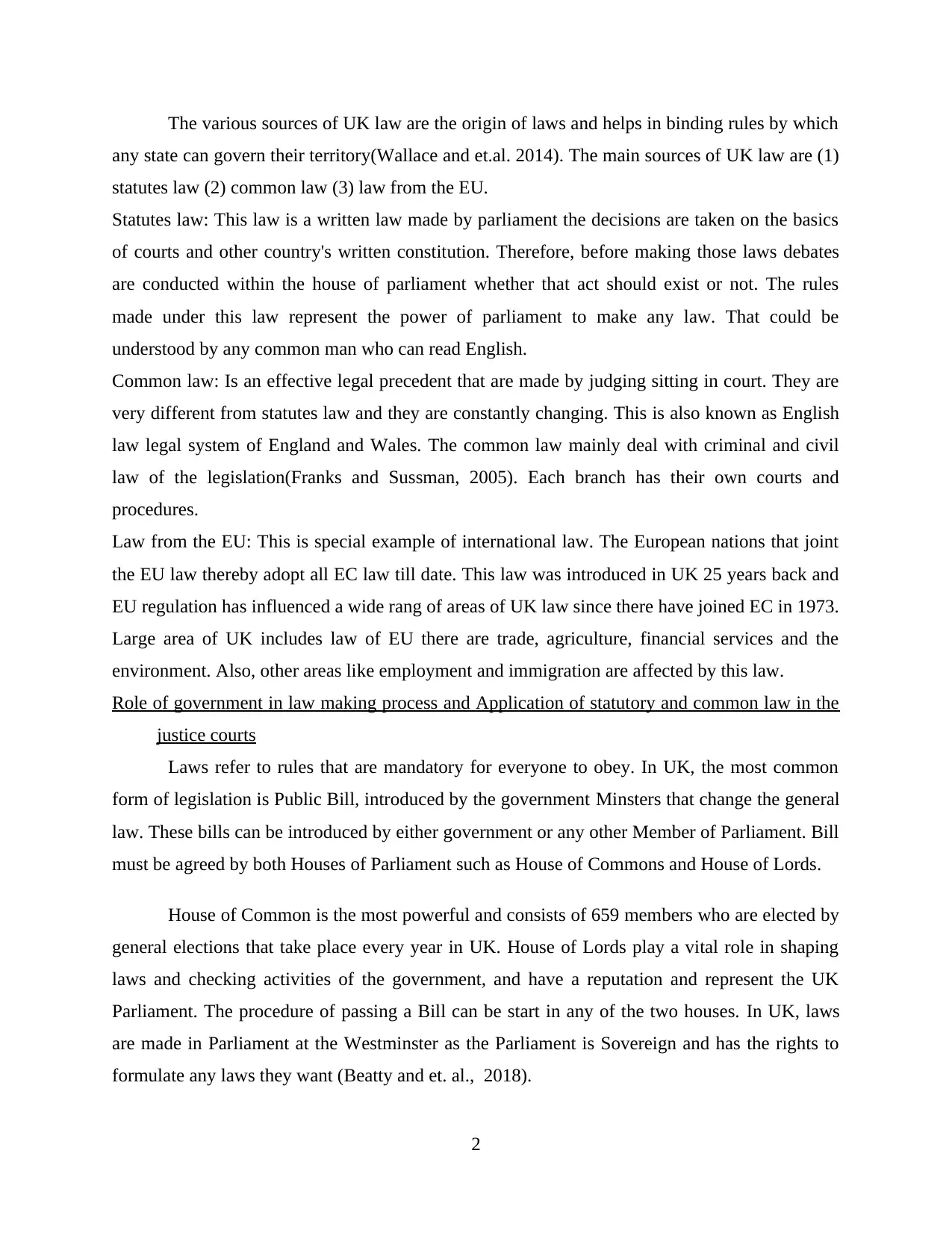
The various sources of UK law are the origin of laws and helps in binding rules by which
any state can govern their territory(Wallace and et.al. 2014). The main sources of UK law are (1)
statutes law (2) common law (3) law from the EU.
Statutes law: This law is a written law made by parliament the decisions are taken on the basics
of courts and other country's written constitution. Therefore, before making those laws debates
are conducted within the house of parliament whether that act should exist or not. The rules
made under this law represent the power of parliament to make any law. That could be
understood by any common man who can read English.
Common law: Is an effective legal precedent that are made by judging sitting in court. They are
very different from statutes law and they are constantly changing. This is also known as English
law legal system of England and Wales. The common law mainly deal with criminal and civil
law of the legislation(Franks and Sussman, 2005). Each branch has their own courts and
procedures.
Law from the EU: This is special example of international law. The European nations that joint
the EU law thereby adopt all EC law till date. This law was introduced in UK 25 years back and
EU regulation has influenced a wide rang of areas of UK law since there have joined EC in 1973.
Large area of UK includes law of EU there are trade, agriculture, financial services and the
environment. Also, other areas like employment and immigration are affected by this law.
Role of government in law making process and Application of statutory and common law in the
justice courts
Laws refer to rules that are mandatory for everyone to obey. In UK, the most common
form of legislation is Public Bill, introduced by the government Minsters that change the general
law. These bills can be introduced by either government or any other Member of Parliament. Bill
must be agreed by both Houses of Parliament such as House of Commons and House of Lords.
House of Common is the most powerful and consists of 659 members who are elected by
general elections that take place every year in UK. House of Lords play a vital role in shaping
laws and checking activities of the government, and have a reputation and represent the UK
Parliament. The procedure of passing a Bill can be start in any of the two houses. In UK, laws
are made in Parliament at the Westminster as the Parliament is Sovereign and has the rights to
formulate any laws they want (Beatty and et. al., 2018).
2
any state can govern their territory(Wallace and et.al. 2014). The main sources of UK law are (1)
statutes law (2) common law (3) law from the EU.
Statutes law: This law is a written law made by parliament the decisions are taken on the basics
of courts and other country's written constitution. Therefore, before making those laws debates
are conducted within the house of parliament whether that act should exist or not. The rules
made under this law represent the power of parliament to make any law. That could be
understood by any common man who can read English.
Common law: Is an effective legal precedent that are made by judging sitting in court. They are
very different from statutes law and they are constantly changing. This is also known as English
law legal system of England and Wales. The common law mainly deal with criminal and civil
law of the legislation(Franks and Sussman, 2005). Each branch has their own courts and
procedures.
Law from the EU: This is special example of international law. The European nations that joint
the EU law thereby adopt all EC law till date. This law was introduced in UK 25 years back and
EU regulation has influenced a wide rang of areas of UK law since there have joined EC in 1973.
Large area of UK includes law of EU there are trade, agriculture, financial services and the
environment. Also, other areas like employment and immigration are affected by this law.
Role of government in law making process and Application of statutory and common law in the
justice courts
Laws refer to rules that are mandatory for everyone to obey. In UK, the most common
form of legislation is Public Bill, introduced by the government Minsters that change the general
law. These bills can be introduced by either government or any other Member of Parliament. Bill
must be agreed by both Houses of Parliament such as House of Commons and House of Lords.
House of Common is the most powerful and consists of 659 members who are elected by
general elections that take place every year in UK. House of Lords play a vital role in shaping
laws and checking activities of the government, and have a reputation and represent the UK
Parliament. The procedure of passing a Bill can be start in any of the two houses. In UK, laws
are made in Parliament at the Westminster as the Parliament is Sovereign and has the rights to
formulate any laws they want (Beatty and et. al., 2018).
2
Paraphrase This Document
Need a fresh take? Get an instant paraphrase of this document with our AI Paraphraser
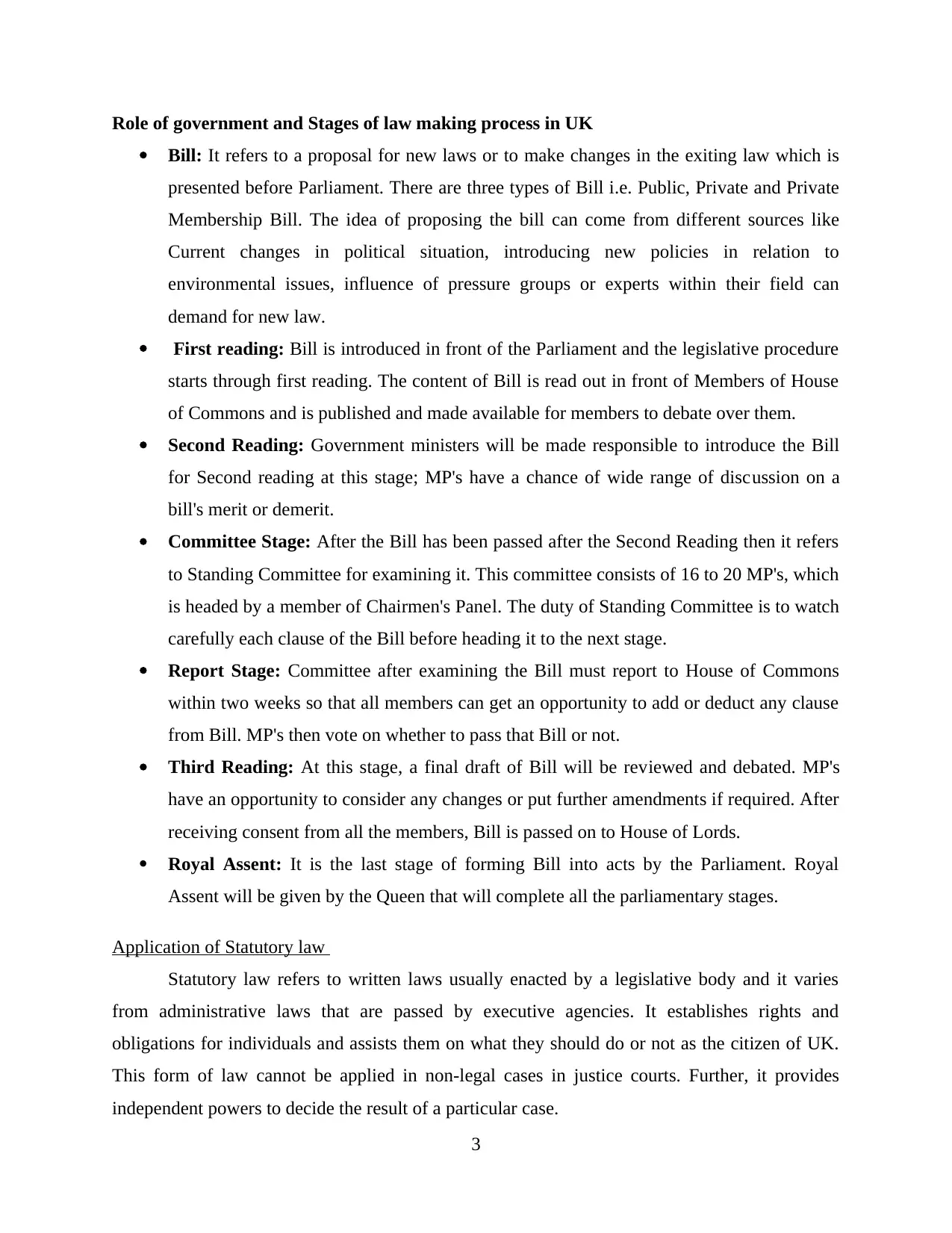
Role of government and Stages of law making process in UK
Bill: It refers to a proposal for new laws or to make changes in the exiting law which is
presented before Parliament. There are three types of Bill i.e. Public, Private and Private
Membership Bill. The idea of proposing the bill can come from different sources like
Current changes in political situation, introducing new policies in relation to
environmental issues, influence of pressure groups or experts within their field can
demand for new law.
First reading: Bill is introduced in front of the Parliament and the legislative procedure
starts through first reading. The content of Bill is read out in front of Members of House
of Commons and is published and made available for members to debate over them.
Second Reading: Government ministers will be made responsible to introduce the Bill
for Second reading at this stage; MP's have a chance of wide range of discussion on a
bill's merit or demerit.
Committee Stage: After the Bill has been passed after the Second Reading then it refers
to Standing Committee for examining it. This committee consists of 16 to 20 MP's, which
is headed by a member of Chairmen's Panel. The duty of Standing Committee is to watch
carefully each clause of the Bill before heading it to the next stage.
Report Stage: Committee after examining the Bill must report to House of Commons
within two weeks so that all members can get an opportunity to add or deduct any clause
from Bill. MP's then vote on whether to pass that Bill or not.
Third Reading: At this stage, a final draft of Bill will be reviewed and debated. MP's
have an opportunity to consider any changes or put further amendments if required. After
receiving consent from all the members, Bill is passed on to House of Lords.
Royal Assent: It is the last stage of forming Bill into acts by the Parliament. Royal
Assent will be given by the Queen that will complete all the parliamentary stages.
Application of Statutory law
Statutory law refers to written laws usually enacted by a legislative body and it varies
from administrative laws that are passed by executive agencies. It establishes rights and
obligations for individuals and assists them on what they should do or not as the citizen of UK.
This form of law cannot be applied in non-legal cases in justice courts. Further, it provides
independent powers to decide the result of a particular case.
3
Bill: It refers to a proposal for new laws or to make changes in the exiting law which is
presented before Parliament. There are three types of Bill i.e. Public, Private and Private
Membership Bill. The idea of proposing the bill can come from different sources like
Current changes in political situation, introducing new policies in relation to
environmental issues, influence of pressure groups or experts within their field can
demand for new law.
First reading: Bill is introduced in front of the Parliament and the legislative procedure
starts through first reading. The content of Bill is read out in front of Members of House
of Commons and is published and made available for members to debate over them.
Second Reading: Government ministers will be made responsible to introduce the Bill
for Second reading at this stage; MP's have a chance of wide range of discussion on a
bill's merit or demerit.
Committee Stage: After the Bill has been passed after the Second Reading then it refers
to Standing Committee for examining it. This committee consists of 16 to 20 MP's, which
is headed by a member of Chairmen's Panel. The duty of Standing Committee is to watch
carefully each clause of the Bill before heading it to the next stage.
Report Stage: Committee after examining the Bill must report to House of Commons
within two weeks so that all members can get an opportunity to add or deduct any clause
from Bill. MP's then vote on whether to pass that Bill or not.
Third Reading: At this stage, a final draft of Bill will be reviewed and debated. MP's
have an opportunity to consider any changes or put further amendments if required. After
receiving consent from all the members, Bill is passed on to House of Lords.
Royal Assent: It is the last stage of forming Bill into acts by the Parliament. Royal
Assent will be given by the Queen that will complete all the parliamentary stages.
Application of Statutory law
Statutory law refers to written laws usually enacted by a legislative body and it varies
from administrative laws that are passed by executive agencies. It establishes rights and
obligations for individuals and assists them on what they should do or not as the citizen of UK.
This form of law cannot be applied in non-legal cases in justice courts. Further, it provides
independent powers to decide the result of a particular case.
3
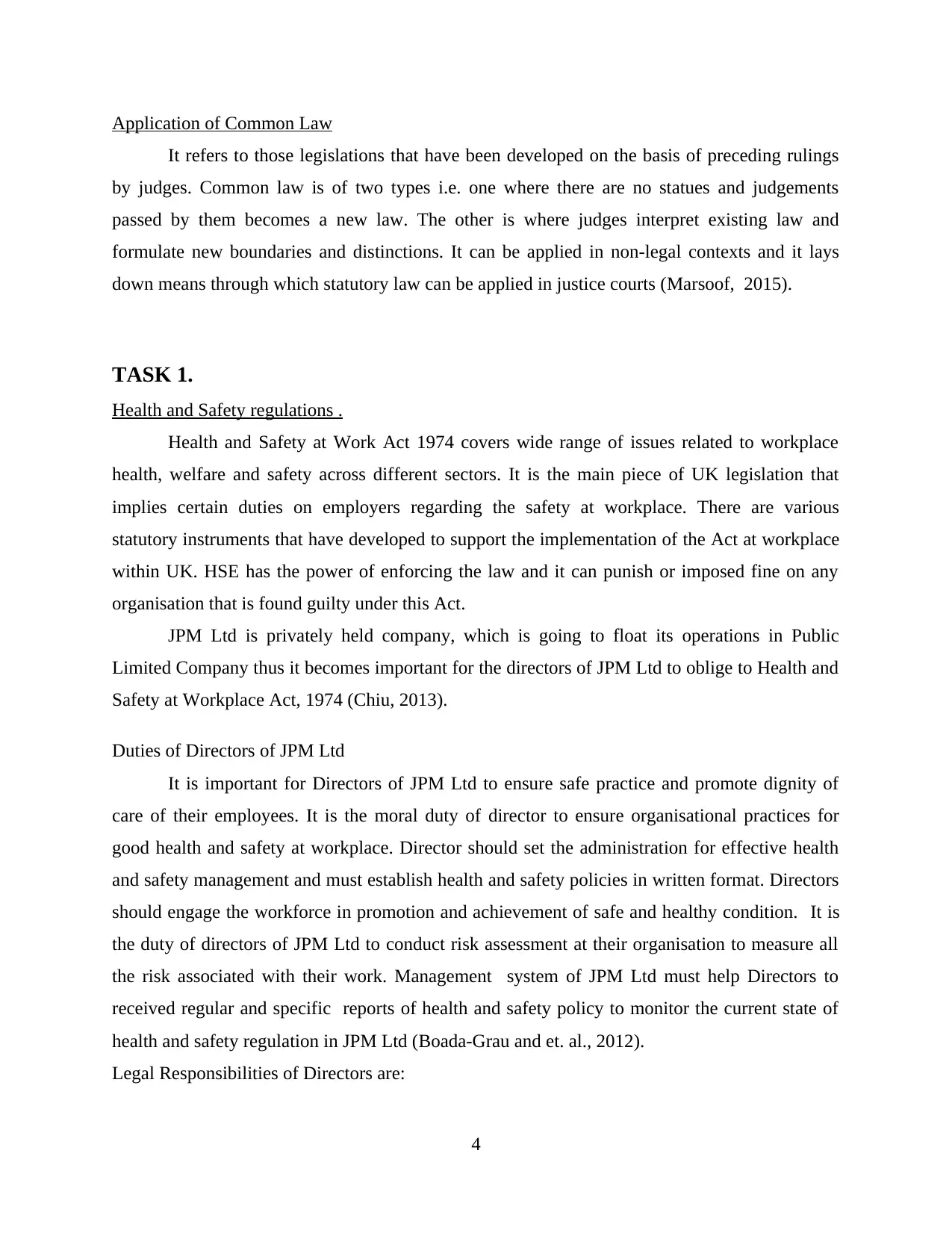
Application of Common Law
It refers to those legislations that have been developed on the basis of preceding rulings
by judges. Common law is of two types i.e. one where there are no statues and judgements
passed by them becomes a new law. The other is where judges interpret existing law and
formulate new boundaries and distinctions. It can be applied in non-legal contexts and it lays
down means through which statutory law can be applied in justice courts (Marsoof, 2015).
TASK 1.
Health and Safety regulations .
Health and Safety at Work Act 1974 covers wide range of issues related to workplace
health, welfare and safety across different sectors. It is the main piece of UK legislation that
implies certain duties on employers regarding the safety at workplace. There are various
statutory instruments that have developed to support the implementation of the Act at workplace
within UK. HSE has the power of enforcing the law and it can punish or imposed fine on any
organisation that is found guilty under this Act.
JPM Ltd is privately held company, which is going to float its operations in Public
Limited Company thus it becomes important for the directors of JPM Ltd to oblige to Health and
Safety at Workplace Act, 1974 (Chiu, 2013).
Duties of Directors of JPM Ltd
It is important for Directors of JPM Ltd to ensure safe practice and promote dignity of
care of their employees. It is the moral duty of director to ensure organisational practices for
good health and safety at workplace. Director should set the administration for effective health
and safety management and must establish health and safety policies in written format. Directors
should engage the workforce in promotion and achievement of safe and healthy condition. It is
the duty of directors of JPM Ltd to conduct risk assessment at their organisation to measure all
the risk associated with their work. Management system of JPM Ltd must help Directors to
received regular and specific reports of health and safety policy to monitor the current state of
health and safety regulation in JPM Ltd (Boada-Grau and et. al., 2012).
Legal Responsibilities of Directors are:
4
It refers to those legislations that have been developed on the basis of preceding rulings
by judges. Common law is of two types i.e. one where there are no statues and judgements
passed by them becomes a new law. The other is where judges interpret existing law and
formulate new boundaries and distinctions. It can be applied in non-legal contexts and it lays
down means through which statutory law can be applied in justice courts (Marsoof, 2015).
TASK 1.
Health and Safety regulations .
Health and Safety at Work Act 1974 covers wide range of issues related to workplace
health, welfare and safety across different sectors. It is the main piece of UK legislation that
implies certain duties on employers regarding the safety at workplace. There are various
statutory instruments that have developed to support the implementation of the Act at workplace
within UK. HSE has the power of enforcing the law and it can punish or imposed fine on any
organisation that is found guilty under this Act.
JPM Ltd is privately held company, which is going to float its operations in Public
Limited Company thus it becomes important for the directors of JPM Ltd to oblige to Health and
Safety at Workplace Act, 1974 (Chiu, 2013).
Duties of Directors of JPM Ltd
It is important for Directors of JPM Ltd to ensure safe practice and promote dignity of
care of their employees. It is the moral duty of director to ensure organisational practices for
good health and safety at workplace. Director should set the administration for effective health
and safety management and must establish health and safety policies in written format. Directors
should engage the workforce in promotion and achievement of safe and healthy condition. It is
the duty of directors of JPM Ltd to conduct risk assessment at their organisation to measure all
the risk associated with their work. Management system of JPM Ltd must help Directors to
received regular and specific reports of health and safety policy to monitor the current state of
health and safety regulation in JPM Ltd (Boada-Grau and et. al., 2012).
Legal Responsibilities of Directors are:
4
⊘ This is a preview!⊘
Do you want full access?
Subscribe today to unlock all pages.

Trusted by 1+ million students worldwide
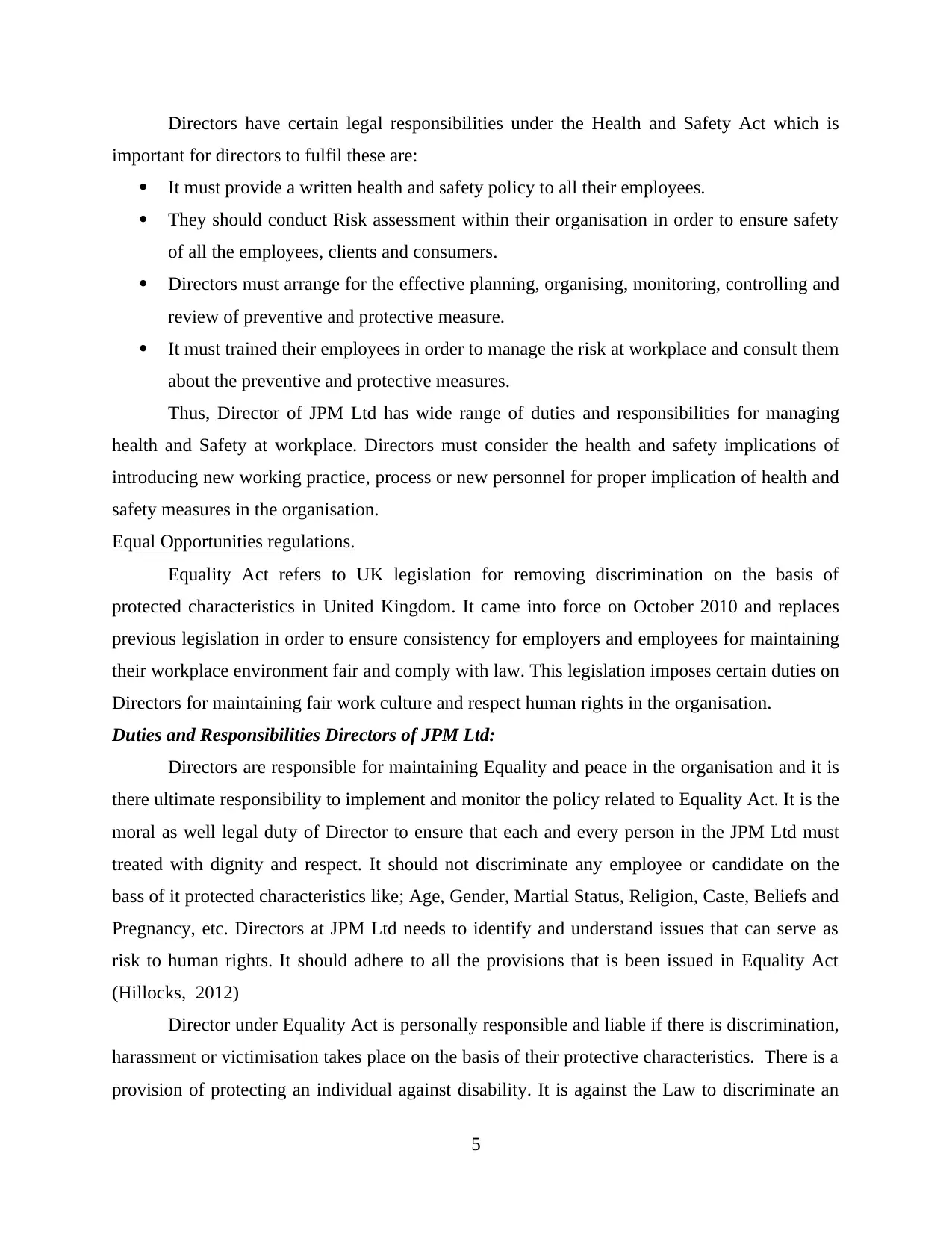
Directors have certain legal responsibilities under the Health and Safety Act which is
important for directors to fulfil these are:
It must provide a written health and safety policy to all their employees.
They should conduct Risk assessment within their organisation in order to ensure safety
of all the employees, clients and consumers.
Directors must arrange for the effective planning, organising, monitoring, controlling and
review of preventive and protective measure.
It must trained their employees in order to manage the risk at workplace and consult them
about the preventive and protective measures.
Thus, Director of JPM Ltd has wide range of duties and responsibilities for managing
health and Safety at workplace. Directors must consider the health and safety implications of
introducing new working practice, process or new personnel for proper implication of health and
safety measures in the organisation.
Equal Opportunities regulations.
Equality Act refers to UK legislation for removing discrimination on the basis of
protected characteristics in United Kingdom. It came into force on October 2010 and replaces
previous legislation in order to ensure consistency for employers and employees for maintaining
their workplace environment fair and comply with law. This legislation imposes certain duties on
Directors for maintaining fair work culture and respect human rights in the organisation.
Duties and Responsibilities Directors of JPM Ltd:
Directors are responsible for maintaining Equality and peace in the organisation and it is
there ultimate responsibility to implement and monitor the policy related to Equality Act. It is the
moral as well legal duty of Director to ensure that each and every person in the JPM Ltd must
treated with dignity and respect. It should not discriminate any employee or candidate on the
bass of it protected characteristics like; Age, Gender, Martial Status, Religion, Caste, Beliefs and
Pregnancy, etc. Directors at JPM Ltd needs to identify and understand issues that can serve as
risk to human rights. It should adhere to all the provisions that is been issued in Equality Act
(Hillocks, 2012)
Director under Equality Act is personally responsible and liable if there is discrimination,
harassment or victimisation takes place on the basis of their protective characteristics. There is a
provision of protecting an individual against disability. It is against the Law to discriminate an
5
important for directors to fulfil these are:
It must provide a written health and safety policy to all their employees.
They should conduct Risk assessment within their organisation in order to ensure safety
of all the employees, clients and consumers.
Directors must arrange for the effective planning, organising, monitoring, controlling and
review of preventive and protective measure.
It must trained their employees in order to manage the risk at workplace and consult them
about the preventive and protective measures.
Thus, Director of JPM Ltd has wide range of duties and responsibilities for managing
health and Safety at workplace. Directors must consider the health and safety implications of
introducing new working practice, process or new personnel for proper implication of health and
safety measures in the organisation.
Equal Opportunities regulations.
Equality Act refers to UK legislation for removing discrimination on the basis of
protected characteristics in United Kingdom. It came into force on October 2010 and replaces
previous legislation in order to ensure consistency for employers and employees for maintaining
their workplace environment fair and comply with law. This legislation imposes certain duties on
Directors for maintaining fair work culture and respect human rights in the organisation.
Duties and Responsibilities Directors of JPM Ltd:
Directors are responsible for maintaining Equality and peace in the organisation and it is
there ultimate responsibility to implement and monitor the policy related to Equality Act. It is the
moral as well legal duty of Director to ensure that each and every person in the JPM Ltd must
treated with dignity and respect. It should not discriminate any employee or candidate on the
bass of it protected characteristics like; Age, Gender, Martial Status, Religion, Caste, Beliefs and
Pregnancy, etc. Directors at JPM Ltd needs to identify and understand issues that can serve as
risk to human rights. It should adhere to all the provisions that is been issued in Equality Act
(Hillocks, 2012)
Director under Equality Act is personally responsible and liable if there is discrimination,
harassment or victimisation takes place on the basis of their protective characteristics. There is a
provision of protecting an individual against disability. It is against the Law to discriminate an
5
Paraphrase This Document
Need a fresh take? Get an instant paraphrase of this document with our AI Paraphraser
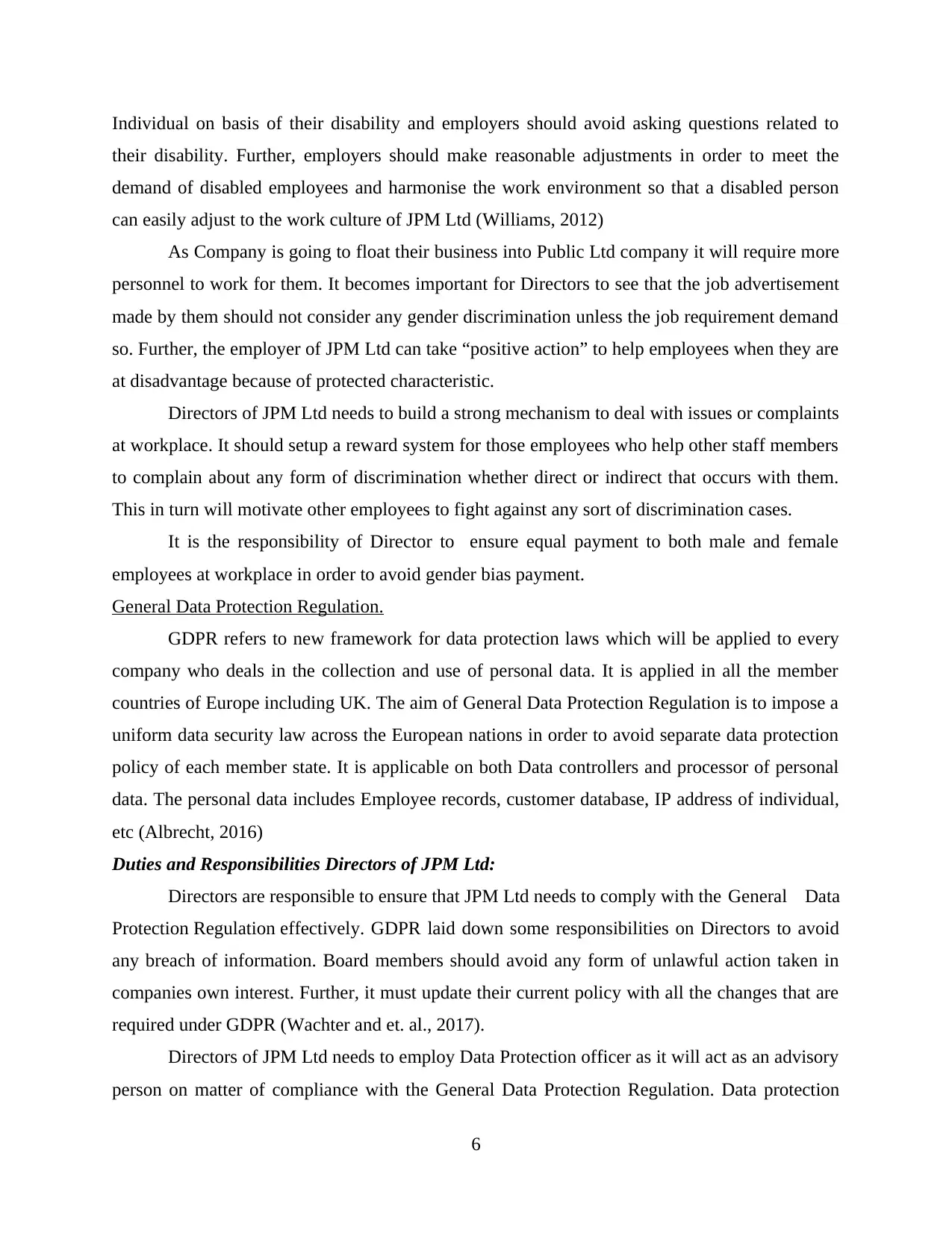
Individual on basis of their disability and employers should avoid asking questions related to
their disability. Further, employers should make reasonable adjustments in order to meet the
demand of disabled employees and harmonise the work environment so that a disabled person
can easily adjust to the work culture of JPM Ltd (Williams, 2012)
As Company is going to float their business into Public Ltd company it will require more
personnel to work for them. It becomes important for Directors to see that the job advertisement
made by them should not consider any gender discrimination unless the job requirement demand
so. Further, the employer of JPM Ltd can take “positive action” to help employees when they are
at disadvantage because of protected characteristic.
Directors of JPM Ltd needs to build a strong mechanism to deal with issues or complaints
at workplace. It should setup a reward system for those employees who help other staff members
to complain about any form of discrimination whether direct or indirect that occurs with them.
This in turn will motivate other employees to fight against any sort of discrimination cases.
It is the responsibility of Director to ensure equal payment to both male and female
employees at workplace in order to avoid gender bias payment.
General Data Protection Regulation.
GDPR refers to new framework for data protection laws which will be applied to every
company who deals in the collection and use of personal data. It is applied in all the member
countries of Europe including UK. The aim of General Data Protection Regulation is to impose a
uniform data security law across the European nations in order to avoid separate data protection
policy of each member state. It is applicable on both Data controllers and processor of personal
data. The personal data includes Employee records, customer database, IP address of individual,
etc (Albrecht, 2016)
Duties and Responsibilities Directors of JPM Ltd:
Directors are responsible to ensure that JPM Ltd needs to comply with the General Data
Protection Regulation effectively. GDPR laid down some responsibilities on Directors to avoid
any breach of information. Board members should avoid any form of unlawful action taken in
companies own interest. Further, it must update their current policy with all the changes that are
required under GDPR (Wachter and et. al., 2017).
Directors of JPM Ltd needs to employ Data Protection officer as it will act as an advisory
person on matter of compliance with the General Data Protection Regulation. Data protection
6
their disability. Further, employers should make reasonable adjustments in order to meet the
demand of disabled employees and harmonise the work environment so that a disabled person
can easily adjust to the work culture of JPM Ltd (Williams, 2012)
As Company is going to float their business into Public Ltd company it will require more
personnel to work for them. It becomes important for Directors to see that the job advertisement
made by them should not consider any gender discrimination unless the job requirement demand
so. Further, the employer of JPM Ltd can take “positive action” to help employees when they are
at disadvantage because of protected characteristic.
Directors of JPM Ltd needs to build a strong mechanism to deal with issues or complaints
at workplace. It should setup a reward system for those employees who help other staff members
to complain about any form of discrimination whether direct or indirect that occurs with them.
This in turn will motivate other employees to fight against any sort of discrimination cases.
It is the responsibility of Director to ensure equal payment to both male and female
employees at workplace in order to avoid gender bias payment.
General Data Protection Regulation.
GDPR refers to new framework for data protection laws which will be applied to every
company who deals in the collection and use of personal data. It is applied in all the member
countries of Europe including UK. The aim of General Data Protection Regulation is to impose a
uniform data security law across the European nations in order to avoid separate data protection
policy of each member state. It is applicable on both Data controllers and processor of personal
data. The personal data includes Employee records, customer database, IP address of individual,
etc (Albrecht, 2016)
Duties and Responsibilities Directors of JPM Ltd:
Directors are responsible to ensure that JPM Ltd needs to comply with the General Data
Protection Regulation effectively. GDPR laid down some responsibilities on Directors to avoid
any breach of information. Board members should avoid any form of unlawful action taken in
companies own interest. Further, it must update their current policy with all the changes that are
required under GDPR (Wachter and et. al., 2017).
Directors of JPM Ltd needs to employ Data Protection officer as it will act as an advisory
person on matter of compliance with the General Data Protection Regulation. Data protection
6
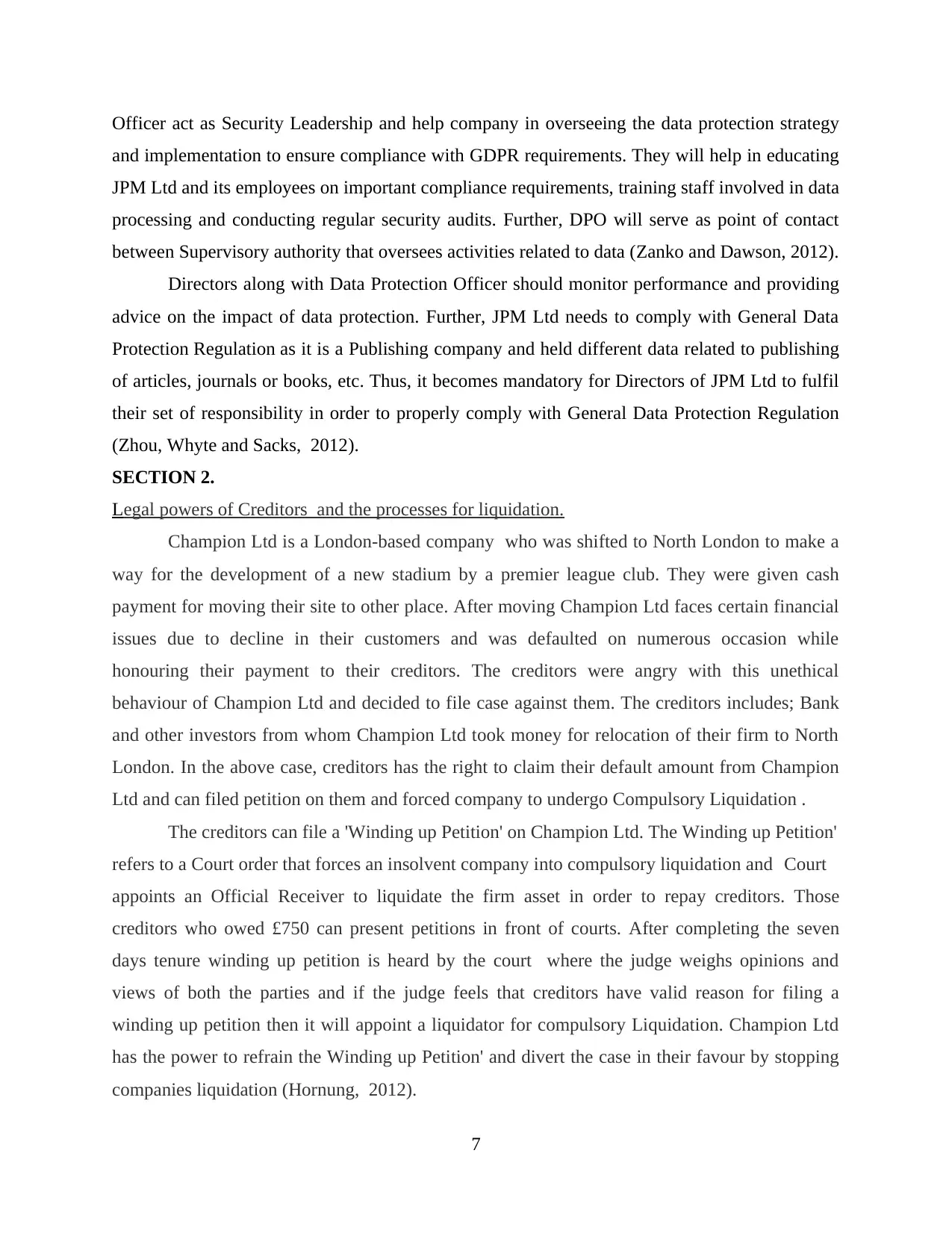
Officer act as Security Leadership and help company in overseeing the data protection strategy
and implementation to ensure compliance with GDPR requirements. They will help in educating
JPM Ltd and its employees on important compliance requirements, training staff involved in data
processing and conducting regular security audits. Further, DPO will serve as point of contact
between Supervisory authority that oversees activities related to data (Zanko and Dawson, 2012).
Directors along with Data Protection Officer should monitor performance and providing
advice on the impact of data protection. Further, JPM Ltd needs to comply with General Data
Protection Regulation as it is a Publishing company and held different data related to publishing
of articles, journals or books, etc. Thus, it becomes mandatory for Directors of JPM Ltd to fulfil
their set of responsibility in order to properly comply with General Data Protection Regulation
(Zhou, Whyte and Sacks, 2012).
SECTION 2.
Legal powers of Creditors and the processes for liquidation.
Champion Ltd is a London-based company who was shifted to North London to make a
way for the development of a new stadium by a premier league club. They were given cash
payment for moving their site to other place. After moving Champion Ltd faces certain financial
issues due to decline in their customers and was defaulted on numerous occasion while
honouring their payment to their creditors. The creditors were angry with this unethical
behaviour of Champion Ltd and decided to file case against them. The creditors includes; Bank
and other investors from whom Champion Ltd took money for relocation of their firm to North
London. In the above case, creditors has the right to claim their default amount from Champion
Ltd and can filed petition on them and forced company to undergo Compulsory Liquidation .
The creditors can file a 'Winding up Petition' on Champion Ltd. The Winding up Petition'
refers to a Court order that forces an insolvent company into compulsory liquidation and Court
appoints an Official Receiver to liquidate the firm asset in order to repay creditors. Those
creditors who owed £750 can present petitions in front of courts. After completing the seven
days tenure winding up petition is heard by the court where the judge weighs opinions and
views of both the parties and if the judge feels that creditors have valid reason for filing a
winding up petition then it will appoint a liquidator for compulsory Liquidation. Champion Ltd
has the power to refrain the Winding up Petition' and divert the case in their favour by stopping
companies liquidation (Hornung, 2012).
7
and implementation to ensure compliance with GDPR requirements. They will help in educating
JPM Ltd and its employees on important compliance requirements, training staff involved in data
processing and conducting regular security audits. Further, DPO will serve as point of contact
between Supervisory authority that oversees activities related to data (Zanko and Dawson, 2012).
Directors along with Data Protection Officer should monitor performance and providing
advice on the impact of data protection. Further, JPM Ltd needs to comply with General Data
Protection Regulation as it is a Publishing company and held different data related to publishing
of articles, journals or books, etc. Thus, it becomes mandatory for Directors of JPM Ltd to fulfil
their set of responsibility in order to properly comply with General Data Protection Regulation
(Zhou, Whyte and Sacks, 2012).
SECTION 2.
Legal powers of Creditors and the processes for liquidation.
Champion Ltd is a London-based company who was shifted to North London to make a
way for the development of a new stadium by a premier league club. They were given cash
payment for moving their site to other place. After moving Champion Ltd faces certain financial
issues due to decline in their customers and was defaulted on numerous occasion while
honouring their payment to their creditors. The creditors were angry with this unethical
behaviour of Champion Ltd and decided to file case against them. The creditors includes; Bank
and other investors from whom Champion Ltd took money for relocation of their firm to North
London. In the above case, creditors has the right to claim their default amount from Champion
Ltd and can filed petition on them and forced company to undergo Compulsory Liquidation .
The creditors can file a 'Winding up Petition' on Champion Ltd. The Winding up Petition'
refers to a Court order that forces an insolvent company into compulsory liquidation and Court
appoints an Official Receiver to liquidate the firm asset in order to repay creditors. Those
creditors who owed £750 can present petitions in front of courts. After completing the seven
days tenure winding up petition is heard by the court where the judge weighs opinions and
views of both the parties and if the judge feels that creditors have valid reason for filing a
winding up petition then it will appoint a liquidator for compulsory Liquidation. Champion Ltd
has the power to refrain the Winding up Petition' and divert the case in their favour by stopping
companies liquidation (Hornung, 2012).
7
⊘ This is a preview!⊘
Do you want full access?
Subscribe today to unlock all pages.

Trusted by 1+ million students worldwide
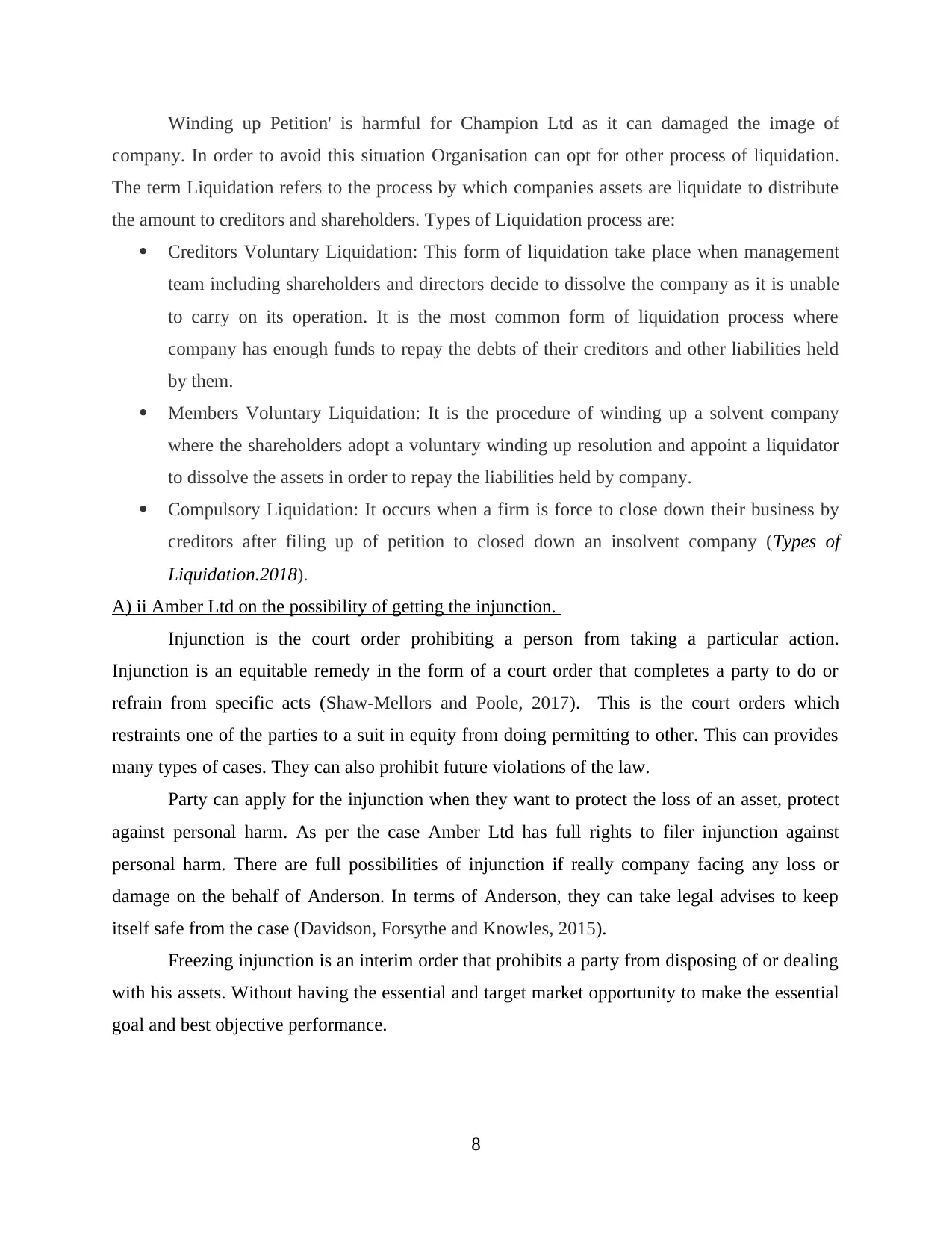
Winding up Petition' is harmful for Champion Ltd as it can damaged the image of
company. In order to avoid this situation Organisation can opt for other process of liquidation.
The term Liquidation refers to the process by which companies assets are liquidate to distribute
the amount to creditors and shareholders. Types of Liquidation process are:
Creditors Voluntary Liquidation: This form of liquidation take place when management
team including shareholders and directors decide to dissolve the company as it is unable
to carry on its operation. It is the most common form of liquidation process where
company has enough funds to repay the debts of their creditors and other liabilities held
by them.
Members Voluntary Liquidation: It is the procedure of winding up a solvent company
where the shareholders adopt a voluntary winding up resolution and appoint a liquidator
to dissolve the assets in order to repay the liabilities held by company.
Compulsory Liquidation: It occurs when a firm is force to close down their business by
creditors after filing up of petition to closed down an insolvent company (Types of
Liquidation.2018).
A) ii Amber Ltd on the possibility of getting the injunction.
Injunction is the court order prohibiting a person from taking a particular action.
Injunction is an equitable remedy in the form of a court order that completes a party to do or
refrain from specific acts (Shaw-Mellors and Poole, 2017). This is the court orders which
restraints one of the parties to a suit in equity from doing permitting to other. This can provides
many types of cases. They can also prohibit future violations of the law.
Party can apply for the injunction when they want to protect the loss of an asset, protect
against personal harm. As per the case Amber Ltd has full rights to filer injunction against
personal harm. There are full possibilities of injunction if really company facing any loss or
damage on the behalf of Anderson. In terms of Anderson, they can take legal advises to keep
itself safe from the case (Davidson, Forsythe and Knowles, 2015).
Freezing injunction is an interim order that prohibits a party from disposing of or dealing
with his assets. Without having the essential and target market opportunity to make the essential
goal and best objective performance.
8
company. In order to avoid this situation Organisation can opt for other process of liquidation.
The term Liquidation refers to the process by which companies assets are liquidate to distribute
the amount to creditors and shareholders. Types of Liquidation process are:
Creditors Voluntary Liquidation: This form of liquidation take place when management
team including shareholders and directors decide to dissolve the company as it is unable
to carry on its operation. It is the most common form of liquidation process where
company has enough funds to repay the debts of their creditors and other liabilities held
by them.
Members Voluntary Liquidation: It is the procedure of winding up a solvent company
where the shareholders adopt a voluntary winding up resolution and appoint a liquidator
to dissolve the assets in order to repay the liabilities held by company.
Compulsory Liquidation: It occurs when a firm is force to close down their business by
creditors after filing up of petition to closed down an insolvent company (Types of
Liquidation.2018).
A) ii Amber Ltd on the possibility of getting the injunction.
Injunction is the court order prohibiting a person from taking a particular action.
Injunction is an equitable remedy in the form of a court order that completes a party to do or
refrain from specific acts (Shaw-Mellors and Poole, 2017). This is the court orders which
restraints one of the parties to a suit in equity from doing permitting to other. This can provides
many types of cases. They can also prohibit future violations of the law.
Party can apply for the injunction when they want to protect the loss of an asset, protect
against personal harm. As per the case Amber Ltd has full rights to filer injunction against
personal harm. There are full possibilities of injunction if really company facing any loss or
damage on the behalf of Anderson. In terms of Anderson, they can take legal advises to keep
itself safe from the case (Davidson, Forsythe and Knowles, 2015).
Freezing injunction is an interim order that prohibits a party from disposing of or dealing
with his assets. Without having the essential and target market opportunity to make the essential
goal and best objective performance.
8
Paraphrase This Document
Need a fresh take? Get an instant paraphrase of this document with our AI Paraphraser
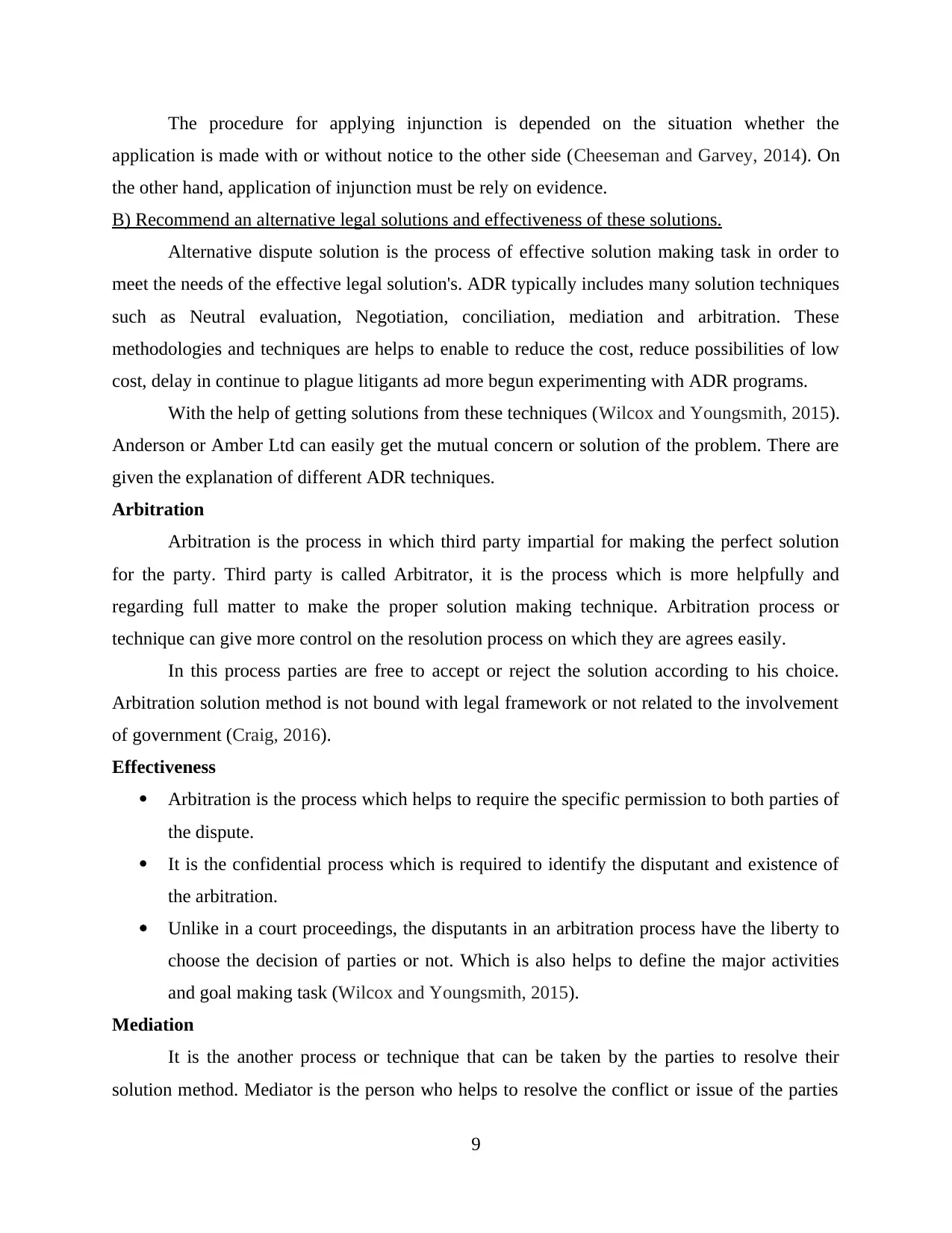
The procedure for applying injunction is depended on the situation whether the
application is made with or without notice to the other side (Cheeseman and Garvey, 2014). On
the other hand, application of injunction must be rely on evidence.
B) Recommend an alternative legal solutions and effectiveness of these solutions.
Alternative dispute solution is the process of effective solution making task in order to
meet the needs of the effective legal solution's. ADR typically includes many solution techniques
such as Neutral evaluation, Negotiation, conciliation, mediation and arbitration. These
methodologies and techniques are helps to enable to reduce the cost, reduce possibilities of low
cost, delay in continue to plague litigants ad more begun experimenting with ADR programs.
With the help of getting solutions from these techniques (Wilcox and Youngsmith, 2015).
Anderson or Amber Ltd can easily get the mutual concern or solution of the problem. There are
given the explanation of different ADR techniques.
Arbitration
Arbitration is the process in which third party impartial for making the perfect solution
for the party. Third party is called Arbitrator, it is the process which is more helpfully and
regarding full matter to make the proper solution making technique. Arbitration process or
technique can give more control on the resolution process on which they are agrees easily.
In this process parties are free to accept or reject the solution according to his choice.
Arbitration solution method is not bound with legal framework or not related to the involvement
of government (Craig, 2016).
Effectiveness
Arbitration is the process which helps to require the specific permission to both parties of
the dispute.
It is the confidential process which is required to identify the disputant and existence of
the arbitration.
Unlike in a court proceedings, the disputants in an arbitration process have the liberty to
choose the decision of parties or not. Which is also helps to define the major activities
and goal making task (Wilcox and Youngsmith, 2015).
Mediation
It is the another process or technique that can be taken by the parties to resolve their
solution method. Mediator is the person who helps to resolve the conflict or issue of the parties
9
application is made with or without notice to the other side (Cheeseman and Garvey, 2014). On
the other hand, application of injunction must be rely on evidence.
B) Recommend an alternative legal solutions and effectiveness of these solutions.
Alternative dispute solution is the process of effective solution making task in order to
meet the needs of the effective legal solution's. ADR typically includes many solution techniques
such as Neutral evaluation, Negotiation, conciliation, mediation and arbitration. These
methodologies and techniques are helps to enable to reduce the cost, reduce possibilities of low
cost, delay in continue to plague litigants ad more begun experimenting with ADR programs.
With the help of getting solutions from these techniques (Wilcox and Youngsmith, 2015).
Anderson or Amber Ltd can easily get the mutual concern or solution of the problem. There are
given the explanation of different ADR techniques.
Arbitration
Arbitration is the process in which third party impartial for making the perfect solution
for the party. Third party is called Arbitrator, it is the process which is more helpfully and
regarding full matter to make the proper solution making technique. Arbitration process or
technique can give more control on the resolution process on which they are agrees easily.
In this process parties are free to accept or reject the solution according to his choice.
Arbitration solution method is not bound with legal framework or not related to the involvement
of government (Craig, 2016).
Effectiveness
Arbitration is the process which helps to require the specific permission to both parties of
the dispute.
It is the confidential process which is required to identify the disputant and existence of
the arbitration.
Unlike in a court proceedings, the disputants in an arbitration process have the liberty to
choose the decision of parties or not. Which is also helps to define the major activities
and goal making task (Wilcox and Youngsmith, 2015).
Mediation
It is the another process or technique that can be taken by the parties to resolve their
solution method. Mediator is the person who helps to resolve the conflict or issue of the parties
9
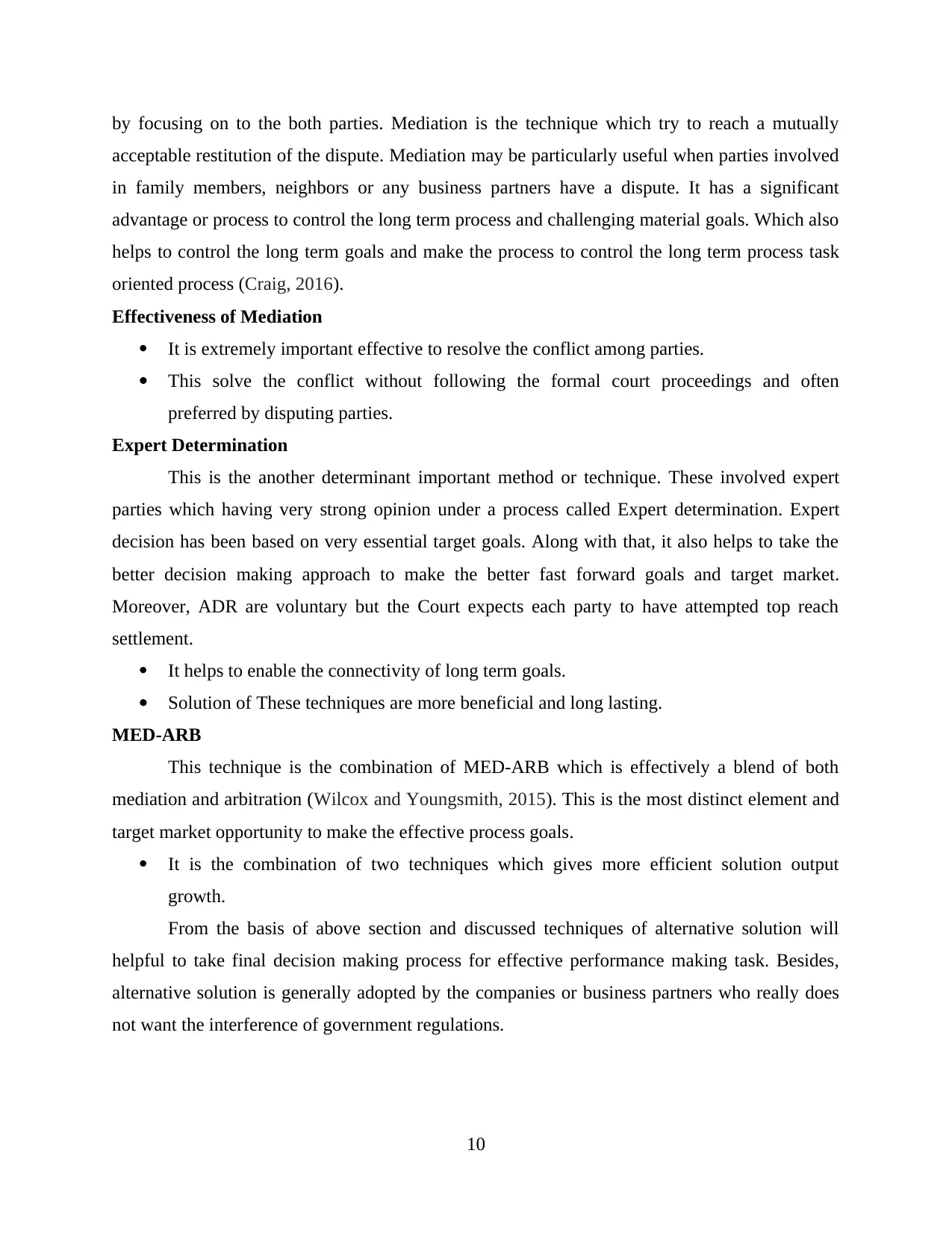
by focusing on to the both parties. Mediation is the technique which try to reach a mutually
acceptable restitution of the dispute. Mediation may be particularly useful when parties involved
in family members, neighbors or any business partners have a dispute. It has a significant
advantage or process to control the long term process and challenging material goals. Which also
helps to control the long term goals and make the process to control the long term process task
oriented process (Craig, 2016).
Effectiveness of Mediation
It is extremely important effective to resolve the conflict among parties.
This solve the conflict without following the formal court proceedings and often
preferred by disputing parties.
Expert Determination
This is the another determinant important method or technique. These involved expert
parties which having very strong opinion under a process called Expert determination. Expert
decision has been based on very essential target goals. Along with that, it also helps to take the
better decision making approach to make the better fast forward goals and target market.
Moreover, ADR are voluntary but the Court expects each party to have attempted top reach
settlement.
It helps to enable the connectivity of long term goals.
Solution of These techniques are more beneficial and long lasting.
MED-ARB
This technique is the combination of MED-ARB which is effectively a blend of both
mediation and arbitration (Wilcox and Youngsmith, 2015). This is the most distinct element and
target market opportunity to make the effective process goals.
It is the combination of two techniques which gives more efficient solution output
growth.
From the basis of above section and discussed techniques of alternative solution will
helpful to take final decision making process for effective performance making task. Besides,
alternative solution is generally adopted by the companies or business partners who really does
not want the interference of government regulations.
10
acceptable restitution of the dispute. Mediation may be particularly useful when parties involved
in family members, neighbors or any business partners have a dispute. It has a significant
advantage or process to control the long term process and challenging material goals. Which also
helps to control the long term goals and make the process to control the long term process task
oriented process (Craig, 2016).
Effectiveness of Mediation
It is extremely important effective to resolve the conflict among parties.
This solve the conflict without following the formal court proceedings and often
preferred by disputing parties.
Expert Determination
This is the another determinant important method or technique. These involved expert
parties which having very strong opinion under a process called Expert determination. Expert
decision has been based on very essential target goals. Along with that, it also helps to take the
better decision making approach to make the better fast forward goals and target market.
Moreover, ADR are voluntary but the Court expects each party to have attempted top reach
settlement.
It helps to enable the connectivity of long term goals.
Solution of These techniques are more beneficial and long lasting.
MED-ARB
This technique is the combination of MED-ARB which is effectively a blend of both
mediation and arbitration (Wilcox and Youngsmith, 2015). This is the most distinct element and
target market opportunity to make the effective process goals.
It is the combination of two techniques which gives more efficient solution output
growth.
From the basis of above section and discussed techniques of alternative solution will
helpful to take final decision making process for effective performance making task. Besides,
alternative solution is generally adopted by the companies or business partners who really does
not want the interference of government regulations.
10
⊘ This is a preview!⊘
Do you want full access?
Subscribe today to unlock all pages.

Trusted by 1+ million students worldwide
1 out of 15
Related Documents
Your All-in-One AI-Powered Toolkit for Academic Success.
+13062052269
info@desklib.com
Available 24*7 on WhatsApp / Email
![[object Object]](/_next/static/media/star-bottom.7253800d.svg)
Unlock your academic potential
Copyright © 2020–2026 A2Z Services. All Rights Reserved. Developed and managed by ZUCOL.



